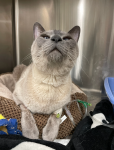Lemi’s Mom
Member Since 2024
Hi all,
My 11-year-old cat was diagnosed with diabetes a few months ago. She started on her insulin (Vetsulin, 1 unit, twice per day) and a special diet. Her hunger increased and she was always begging for food, but she otherwise seemed fine. We brought this up to our regular vet and he seemed unconcerned.
Over the past month we felt like she was extra skinny and losing a lot of weight. We started feeding her more but she still seemed so thin. But otherwise she was her normal self.
it’s a busy time— we are getting ready to move in the next few days and my husband and I were so busy that we didn’t notice until tonight that she hadn’t been bugging us for food like she usually does. She was fine and her appetite was normal this morning. She had thrown up a couple of times throughout the day, but we assumed that she had eaten too fast. She was under the bed and wouldn’t come out for her food. We had to drag her out and she was so lethargic, she couldn’t stand on her own, and her eyes were hazy. We rushed her to the emergency vet and they diagnosed her with DKA.
she is there now for her treatment. They’re giving her fluids, doing ultrasounds, monitoring her glucose everything that I’ve read is standard treatment for DKA. It was expensive and I maxed out my credit cards to make sure that she can get the treatment that she needs. I thank god I had those funds available. We were able to say good night to her before we left and she seemed more alert than when we first noticed that something was wrong. She popped her little head up a bit and her eyes were a lot clearer. She still seemed tired though.
Right now we just can’t stop crying and worrying about our poor little girl. I’m sure the vet was being responsible and covering her bases but the stuff about resuscitation, notifying us if things go south, and the possibility of the E word were just so terrifying and hard to hear.
I would really appreciate support and advice from this forum to help us get through the next few days. I just feel so guilty and so scared. I can’t stand the thought of losing her. I’ve thought about it so many times but it can’t be now, please god it can’t be now.
My 11-year-old cat was diagnosed with diabetes a few months ago. She started on her insulin (Vetsulin, 1 unit, twice per day) and a special diet. Her hunger increased and she was always begging for food, but she otherwise seemed fine. We brought this up to our regular vet and he seemed unconcerned.
Over the past month we felt like she was extra skinny and losing a lot of weight. We started feeding her more but she still seemed so thin. But otherwise she was her normal self.
it’s a busy time— we are getting ready to move in the next few days and my husband and I were so busy that we didn’t notice until tonight that she hadn’t been bugging us for food like she usually does. She was fine and her appetite was normal this morning. She had thrown up a couple of times throughout the day, but we assumed that she had eaten too fast. She was under the bed and wouldn’t come out for her food. We had to drag her out and she was so lethargic, she couldn’t stand on her own, and her eyes were hazy. We rushed her to the emergency vet and they diagnosed her with DKA.
she is there now for her treatment. They’re giving her fluids, doing ultrasounds, monitoring her glucose everything that I’ve read is standard treatment for DKA. It was expensive and I maxed out my credit cards to make sure that she can get the treatment that she needs. I thank god I had those funds available. We were able to say good night to her before we left and she seemed more alert than when we first noticed that something was wrong. She popped her little head up a bit and her eyes were a lot clearer. She still seemed tired though.
Right now we just can’t stop crying and worrying about our poor little girl. I’m sure the vet was being responsible and covering her bases but the stuff about resuscitation, notifying us if things go south, and the possibility of the E word were just so terrifying and hard to hear.
I would really appreciate support and advice from this forum to help us get through the next few days. I just feel so guilty and so scared. I can’t stand the thought of losing her. I’ve thought about it so many times but it can’t be now, please god it can’t be now.



